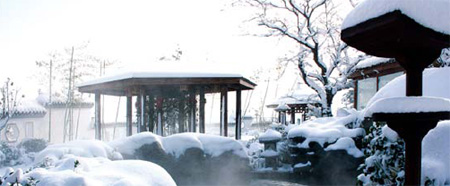Yingkou bubbling over with natural hot springs
|
Its hot springs are a new way for Yingkou to tap into the global tourist market. |
After having seen the springs at Yingkou, in Liaoning province, Horikawa Shinsei, who is from Hokkaido, Japan, which is known worldwide for its hot springs, was surprised and remarked, "I never thought it could have such a large hot spring resort handling a thousand customers daily."
In Japan, any hot spring handling scores of people a day would be considered impressive, Horikawa said.
He should know, since he is an executive director of the Yakuchi Sightseeing Co Ltd, which manages hotspring tours. In Hokkido, his company runs 14 hotels with hot spring services, 12 of them designed in traditional Japanese style.
"Such a wonderful spring should be taken care of and used wisely," he added, referring to the Yingkou springs.
"You need to do more promotions and more advertisements to attract more people from all over the world to boost the hot springs tourist business."
Yingkou sits on Bohai Bay and has a history of hot springs, mainly around the towns of Xiongyue and Shuangtaizi.
In the 16th century, local people used the springs for relaxation and healthcare purposes.
The springs here were recognized by the Liaoning Mineral Water Assessment Committee for their medicinal properties in 1991.
Then the city government reworked the Xiongyue River area to improve the ecology, so spring water levels in 2010 were higher than for 2009, and the highest water temperatures reached 80 C or above.
"The spring water temperaturess run from 80 to 90 C when it comes out, and is cooled naturally overnight for our guests," said Wang Kai, manager of a Yingkou hot spring business.
"People get the most comfortable temperature without a loss of the elements. This is very healthful," Wang said.
These resources make Yingkou a popular tourist destination in the Northeast.
The city had 11.45 billion yuan in tourist revenue, putting it in second place in Liaoning.
"People come here in every season of the year and have a fantastic experience, especially in winter," said Sun Zhi, head of the Yinkou Tourism Bureau.
"The industry also helps consumer spending so developing Yingkou's hot springs responds to the shift in domestic tourism from travel to leisure activities," Sun said.
"So, it's a good time for us to improve infrastructure and make some dramatic changes in the city."
Yingkou lies between the cities of Shenyang and Dalian and is part of the Liaoning coastal economic development belt. It has the possibility of becoming an attractive tourist city since many businesspeople from Liaoning and northeast Asia like to spend their holidays here, experts have said.
"We have almost 1,000 tourists every single day. Even Russian tourists are attracted by our name," said Wang, the manager.
"We need a tourist industry flagship, a major brand to act as a magnet to change this place between Shenyang and Dalian from a hole in the road to a must-stay place. And, the hot springs are the brand, the flagship and the magnet," said Gao Jun, mayor of Yingkou.
(China Daily 06/01/2011 page42)













